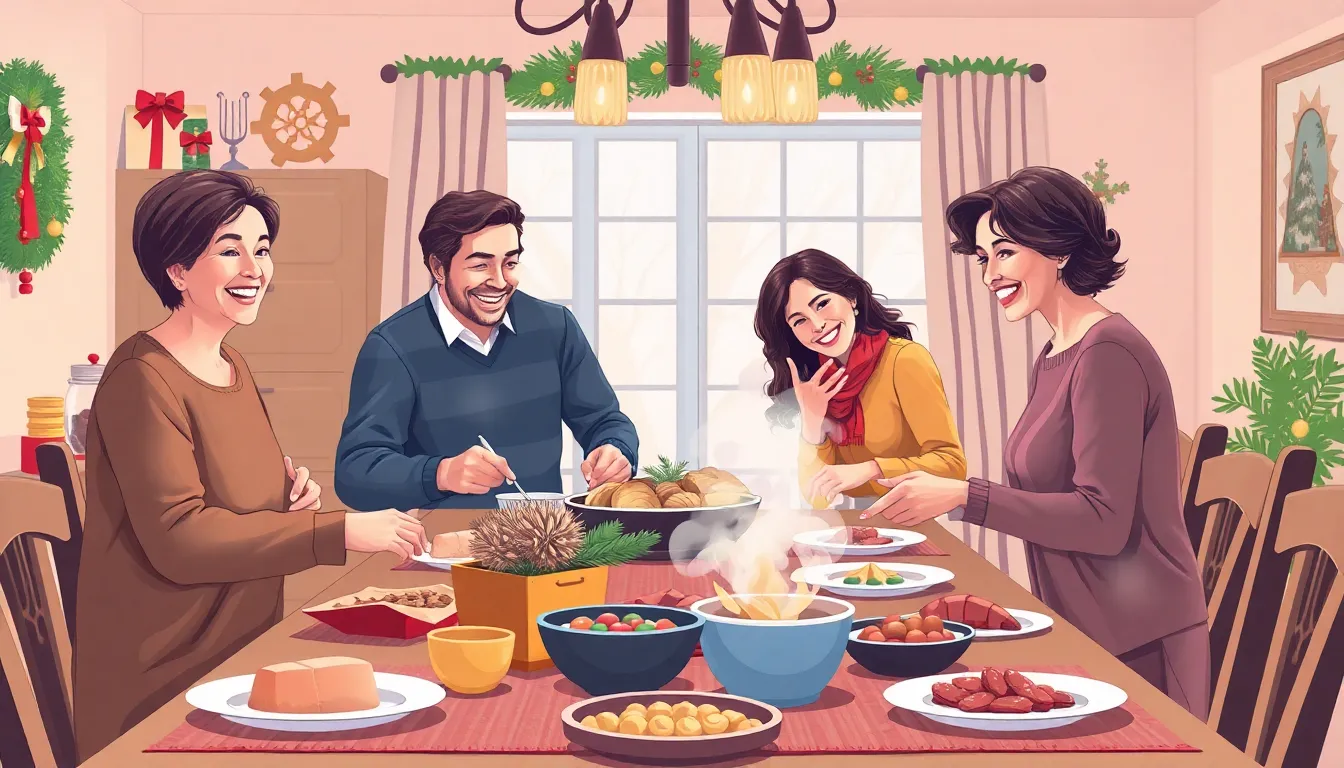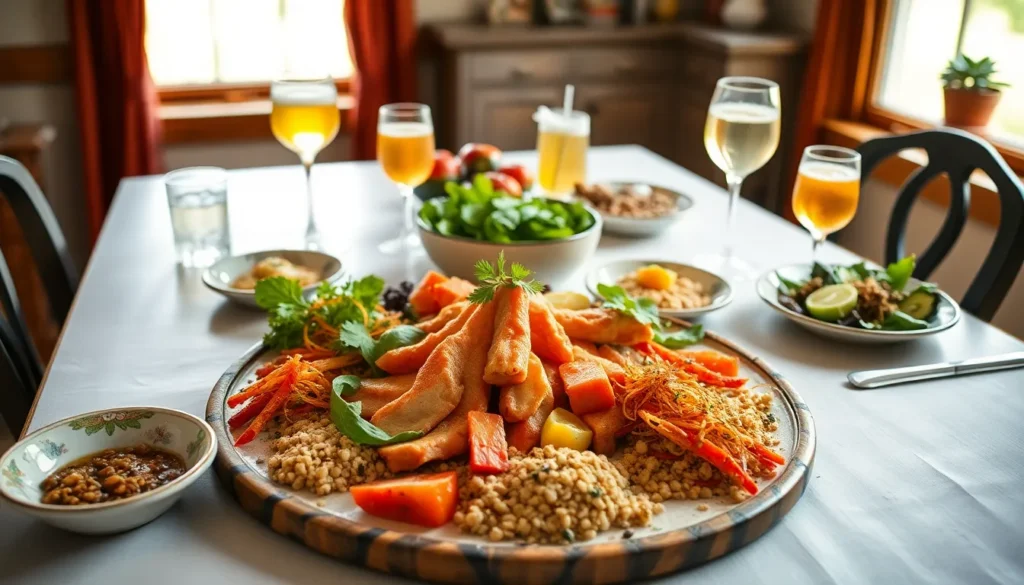Table of Contents
ToggleFamily traditions are the glue that holds us together, often sprinkled with a dash of humor and a pinch of chaos. From the quirky rituals of a family reunion to the peculiar dishes served during holidays, these customs create unforgettable memories. Imagine a Thanksgiving dinner where the turkey is the main event but so is the annual debate over who makes the best stuffing—spoiler alert, it’s always Grandma.
But it’s not just in one corner of the world where these delightful oddities thrive. Across the globe, families celebrate in ways that might make you chuckle or raise an eyebrow. Whether it’s a wild dance-off in a Brazilian carnival or a serene tea ceremony in Japan, each tradition tells a story. So buckle up as we embark on a journey to explore the vibrant tapestry of family traditions around the world, where laughter and love unite us all.
Family Traditions Around The World
Family traditions vary greatly across cultures, enriching lives with diverse experiences. In Brazil, vibrant Carnival celebrations unite families through parades featuring music and dance. Similarly, in Mexico, Día de los Muertos honors loved ones with colorful altars and joyous gatherings. These customs reflect unique cultural identities, reinforcing the importance of family bonds.
Japanese families practice the tradition of Hanami, where they gather under cherry blossom trees to appreciate the beauty of nature. This serene ritual fosters connection and tranquility. Italian families often hold Sunday dinners, creating opportunities for sharing stories over homemade pasta. Engaging in such customs nurtures a sense of belonging.
In Ghana, families celebrate naming ceremonies that introduce newborns to the community. These events highlight the collective joy and responsibilities of family life. Across northern India, Diwali brings families together to light lamps, symbolizing the victory of light over darkness. This festival, filled with sweets and festivities, strengthens familial relationships.
From festive activities in the Philippines to quiet family meals in Scandinavia, traditions shape identities and enhance familial ties. Each tradition serves as a thread, weaving together stories and memories that families cherish for generations. Understanding these customs reveals how families globally cultivate love, connection, and shared heritage.
Importance Of Family Traditions

Family traditions play a crucial role in creating connections, fostering love, and strengthening ties among relatives.
Strengthening Family Bonds
Sharing traditions promotes unity and closeness within families. Families engage in activities that encourage teamwork and collaboration, such as preparing a holiday meal together or participating in cultural celebrations. Each event cultivates shared experiences that become cherished memories. Frequent gatherings around family traditions offer ample opportunities for communication and connecting, reinforcing emotional bonds. Engaging in rituals like family game nights or annual vacations deepens relationships and nurtures feelings of belonging.
Preserving Cultural Heritage
Cultural identity thrives through family traditions. Rituals passed down generations preserve history, values, and language. Families celebrate unique customs that reflect their ancestral roots, ensuring younger members understand their heritage. Annual observances, like Diwali in India or Carnival in Brazil, showcase traditions that reinforce cultural pride. By embracing these practices, families pass on essential life lessons and beliefs to future generations. Participation in cultural events strengthens a sense of community and belonging, highlighting the diverse tapestry of global heritages.
Unique Family Traditions By Region
Family traditions vary widely across the globe, reflecting the diverse cultures and values present in different regions. Exploring these customs reveals fascinating insights into how families celebrate and maintain their connections.
North America
In North America, Thanksgiving serves as a significant tradition for many families. People gather to share a feast, often featuring turkey, stuffing, and pumpkin pie. Celebrations include expressing gratitude and reflecting on the past year. Another notable tradition involves family reunions, where relatives come together to strengthen bonds and share stories. Activities like game nights or outdoor barbecues often complement these gatherings, fostering a sense of belonging and community.
South America
Carnival in Brazil unites families through lively parades, music, and dance. Celebrating this vibrant festival often involves elaborate costumes and street parties. In Argentina, families gather for Sunday asado, enjoying a feast of grilled meats and bonding over shared meals. Customs around Día de los Muertos in Mexico highlight remembrance. Families create beautiful altars for deceased loved ones, blending joy with reflection and honoring their heritage.
Europe
Europe boasts a rich tapestry of family traditions. In Italy, families hold Sunday dinners featuring homemade pasta and stories spanning generations. German families celebrate Weihnachten, marking Christmastime with festive decorations, baked goods, and gift exchanges. The traditions of Midsummer in Sweden focus on outdoor celebrations, including dancing around the maypole and enjoying seasonal dishes. Each custom promotes unity, often blending food, music, and storytelling.
Asia
Asian family traditions often emphasize harmony and respect. In Japan, Hanami encourages families to appreciate cherry blossoms together. This celebration promotes connection with nature and nurtures family ties. Lunar New Year festivities, popular in various Asian countries, involve family reunions and special meals, highlighting cultural heritage. Traditions often include sharing fortunes or participating in communal activities that honor ancestors, reinforcing values and familial bonds.
Africa
In Africa, naming ceremonies play a crucial role in family traditions. In Ghana, these events introduce newborns to the community, celebrating life and family. Festivals like Eid al-Fitr in many African nations bring families together for prayers, feasting, and generosity. Celebrating these occasions involves sharing food and deepening connections within extended families. African traditions prioritize community spirit, often uniting families through vibrant cultural expressions.
Oceania
Oceania’s family traditions highlight respect for nature and the land. In New Zealand, Māori families partake in traditional gatherings, called hui, to share food and stories. Celebrating cultural identity fosters community engagement and strengthens familial ties. In Australia, Christmas barbecues often feature unique local dishes, bringing families together outdoors. Each tradition emphasizes connection, outlining the family’s role in preserving cultural heritage while enjoying shared experiences.
Modern Adaptations Of Traditional Practices
Modern family traditions evolve continuously, adapting to changing societal norms and values. Families increasingly blend customs from different cultures. For instance, multicultural households celebrate holidays like Christmas and Diwali, creating unique celebrations filled with diverse foods and rituals.
Blending Cultures
Cultural integration shapes family practices worldwide. Many families incorporate elements from various traditions to enhance their gatherings. In the United States, for example, a growing number of families participate in both Thanksgiving and Lunar New Year festivities. These blended celebrations often feature traditional dishes from each culture, fostering a sense of unity and understanding among family members. Local influences also play a vital role, as traditions evolve into something uniquely their own.
Influences Of Technology
Technology dramatically impacts how families connect during traditional practices. Video calls enable relatives to share celebrations across long distances. Many families now stream important events, such as weddings and anniversaries, inviting loved ones to partake in real-time despite geographical barriers. Social media allows families to document and share their traditions, creating a virtual scrapbook of memories. Digital platforms often inspire families to explore and adopt new customs, effectively modernizing age-old practices while preserving their significance.
Family traditions serve as the heartbeat of cultural identity and familial bonds. They bring people together through shared experiences and create a sense of belonging that transcends generations. Whether it’s a lively Carnival in Brazil or a quiet Hanami in Japan, these customs enrich lives and foster connections.
As families adapt to modern influences and blend traditions, they continue to celebrate their unique heritages while embracing new practices. The beauty of family traditions lies in their ability to evolve yet remain rooted in love and connection. By cherishing these moments, families not only honor their past but also pave the way for future generations to experience the joy of togetherness.




